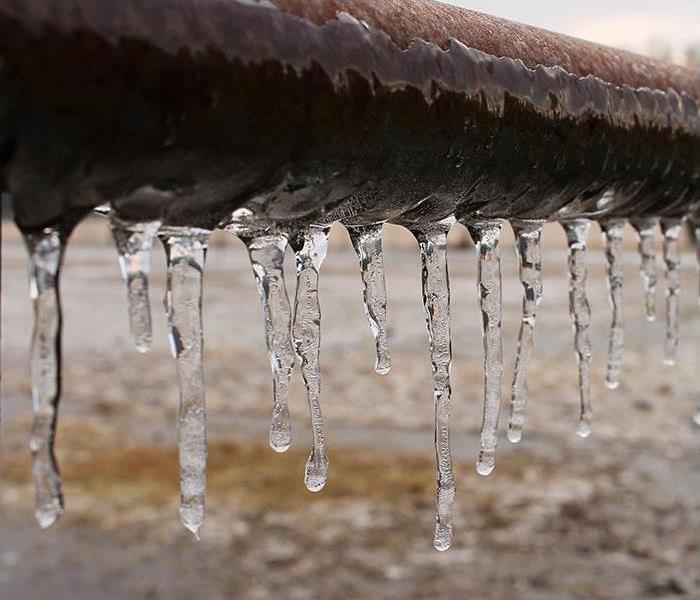How to Avoid Frozen Pipes This Winter
10/27/2018 (Permalink)
 If temperatures sink below freezing level, your home may be at risk for frozen pipes, which can cause major property damage.
If temperatures sink below freezing level, your home may be at risk for frozen pipes, which can cause major property damage.
As winter quickly approaches, it is time to prepare your home for the colder months ahead. Winter weather can bring about more issues than just slippery roads and icy sidewalks. If temperatures sink below freezing level, your home may be at risk for frozen pipes, which can cause major property damage.
When water freezes it expands, which can result in burst pipes, flooding, and major water damage. Frozen pipes are often those exposed to the cold weather, such as those outside your house, or in cold areas such as basements, attics, garages, or kitchen cabinets. A frozen pipe can burst at the point where the ice blockage inside the pipe is located, but typically the rupture is caused by the backflow pressure between the water source and the blockage. A burst pipe can cause considerable damage to your property if not addressed quickly.
To help prevent pipes from freezing in your home this winter, follow these tips and suggestions.
Tip 1: Check Pipes for Leaks
Make sure all leaky pipes are repaired before the winter season begins. Leaky pipes can lead to expensive problems if they’re left untreated when winter comes. Watch for telltale signs of leaky pipes such as unexplained high-water use or water damage. If you suspect you might have a leak, get your home inspected.
Tip 2: Insulate Pipes
If you have any pipes in unheated or uninsulated areas of your home, make sure to wrap the pipes with heat tape or pipe insulation. This can help reduce the risk of water freezing in these pipes when temperatures drop.
Tip 3: Let Water Drip
When temperatures dip below freezing, simply turn your faucets on and let them drip. Allowing water to flow in your pipes helps reduce the risk of freezing.
Tip 4: Keep It Warm
Keep the temperature in your home consistently above 55 degrees, even when you are away. Let warm air circulate to cold areas and pipes. If pipes are under a cabinet, leave the cabinet doors open, allowing warm air to circulate around the pipes.
Tip 5: Shut Off Exterior Faucets
Don’t forget your exterior water systems. If you don’t properly drain water from your exterior faucets and pipes, they may freeze, expand, and cause damage. Disconnect garden hoses and sprinkler systems and drain the water out of faucets. Unless you have frost-proof faucets, you’ll need to use the shut-off valve located inside your house.
Tip 6: Turn Off the Water
If you plan on going out of town for an extended period of time, you may want to consider shutting off the water completely and hiring a service to drain your pipes. With the water turned off you remove the risk of a pipe freezing, bursting and flooding your home while you are gone for a prolonged period of time.
If your home does experience water damage this winter, SERVPRO of North Everett/ Lake Stevens/ Monroe is here to help.
We offer 24/7 emergency service, and we can help prepare your home or restore water damage “Like it never even happened.” Call us at 360-243-8313.






 24/7 Emergency Service
24/7 Emergency Service